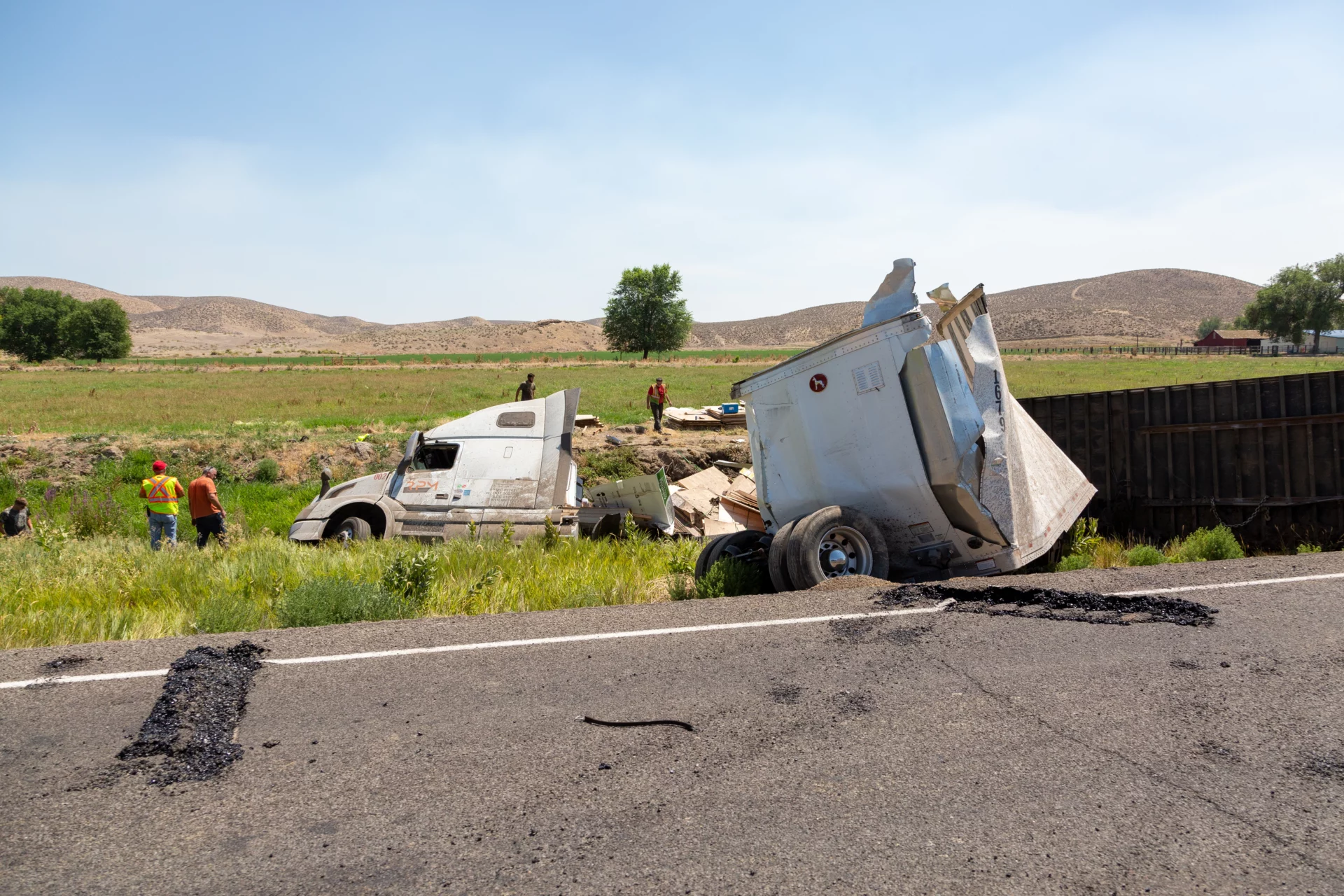
Any type of motor vehicle accident can have devastating consequences, but this is particularly true of collisions involving commercial trucks, also known as tractor-trailers, 18-wheelers, and big rigs. Due to their sheer size and weight, collisions with large trucks frequently result in serious injury or death.
But large trucks and those who drive them are absolutely vital to our economy. Especially during this pandemic, we rely heavily on truck drivers to transport needed supplies, food, pharmaceutical drugs, and medical equipment to homes, hospitals, and stores across the country. From life-saving medications to the home gym you ordered to stay in shape during lockdown, without truck drivers, we would be without the things we need to live, and to live well.
Truck drivers are an integral part of the community of essential workers who have allowed life to go on in the United States, even in the face of a global pandemic. They risk their health and wellbeing every day to ensure that we have access to the things we need. Without them, pandemic life would be much different, and not in a good way. Even so, large trucks can be dangerous.
According to the National Highway Traffic Safety Administration (NHTSA), although commercial trucks only account for about four percent of all registered vehicles in this country, they are involved in nearly nine percent of all fatal motor vehicle accidents.
As a result of this serious national problem, the Federal Motor Carrier Safety Administration (FMCSA) enforces strict hours-of-service rules to ensure that truck drivers aren’t spending too much time behind the wheel. Truck drivers carrying property (as opposed to passengers) may drive a maximum of 11 hours, following 10 consecutive off-duty hours.
Despite these restrictions, however, tractor-trailer accidents continue to occur with shocking frequency, and New Jersey and New York are no exceptions. According to the NHTSA, in 2017, large trucks were involved in 6.2 percent of all fatal crashes in New Jersey, and 8.4 percent of all fatal crashes in New York.
COVID-19 Increase in All Fatal Traffic Crashes
Furthermore, NJ fatal motor vehicle crashes in general are just about as high in 2020, year to date, as 2019’s year-end totals. This is bad news, as we still have two months left in the year. But it’s particularly bad news because this includes the two-month period when virtually everyone was on lockdown due to the COVID-19 pandemic. In 2019, there were 443 fatal crashes in New Jersey, and as of October 29, 2020, there have been 441. Even with people returning to work and school in recent months, there are far less people on the roadways, with many employers offering remote work options, and schools going fully-remote, or providing a hybrid of remote and in-person classes. So what is causing this increase in crashes?
Data released by traffic engineering firm Sam Schwartz revealed that the death rate per 100 million vehicle miles traveled over the first six months of 2020 was up by 12.7 percent from the first six months of 2019. In New York City specifically, vehicle miles traveled plummeted by 40 percent during this time period, yet traffic fatalities only decreased by 10 percent. According to NYC DOT Commissioner Polly Trottenberg, “serial speeders” may be the cause.
And it’s not just a problem in NYC. According to Morgan Dean, spokesperson for AAA Mid-Atlantic, in Virginia, excessive speed has contributed to the increase in fatal crashes involving teens. “We know that, in general, there has been a sharp increase in speeding this year,” said Dean.
David Pabst, of the Wisconsin DOT’s Bureau of Transportation Safety and Technical Services reports that there has also been an increase in fatal crashes in Wisconsin compared to the same period last year. He blames failure to wear seat belts, speeding, and distracted driving for the rise in deaths. “We were all hoping that with traffic down by 20 percent to 25 percent, there would be a commensurate drop in fatalities. But fatalities didn’t drop,” said Pabst.
Although these reports are not specific to truck drivers, it would stand to reason that individuals who spend more time on the roadways than just about anyone else would be no exception. With fatigued and distracted driving, speeding, and other risky behaviors already a problem in the trucking industry, the pandemic-related increase in stress, mental health issues, and job insecurity may have a disproportionate impact on truck drivers.
The reality is, the vast majority of truck drivers utilize safe driving practices and are concerned with the safety and wellbeing of those with whom they share the road. Without these essential workers, we wouldn’t have access to life-saving drugs, medical equipment, and other products needed to stay safe, happy, and healthy, during this pandemic and every day. To dramatically reduce your risk of being seriously injured in an accident involving a large truck, the information below provides tips and tools to help you drive safe around 18 wheelers.
What Causes Most Commercial Truck Accidents?
With the strict hours-of-service and safety rules set by the FMCSA to regulate truck drivers and trucking companies, why are there still so many accidents involving commercial trucks?
For starters, let’s consider the sheer size and weight of commercial trucks. Although large trucks are classified as any truck weighing more than 10,000 (including trailers), they can weigh up to 80,000 pounds. Furthermore, due to their massive size, trucks require a significant amount of braking distance; it is much easier for two passenger vehicles to avoid a collision with each other by slamming on their brakes or swerving to get out of the way. Commercial trucks also have a much larger “blind spot” than passenger vehicles.
Some trucking accidents are caused by the negligence of passenger vehicle drivers, but 18-wheeler crashes are frequently the result of negligence on the part of the truck driver, their employer, or another party. In these cases, multiple parties may be liable for any damages suffered. Examples of truck accidents caused by truck driver, trucking company, or third-party vendor negligence include:
Driver Fatigue
Even with the FMCSA’s hours-of-service rules, truck drivers are allowed to spend a solid 11 hours behind the wheel without a break. If you’ve ever driven for 11 hours straight, you have likely experienced driver fatigue. Studies show that drowsy driving can be just as deadly as drunk driving; in fact, research indicates that a driver who has been awake for 18 hours is similarly impaired to a driver with a blood alcohol concentration (BAC) of 0.08 percent, which is above the legal limit in all 50 states.
Furthermore, an FMCSA study determined that the time of day impacts driver fatigue even more than the number of hours behind the wheel. At night, and particularly after midnight, most truck drivers naturally become less alert due to the internal body clock, otherwise known as the circadian rhythm. In layman’s terms—humans are not nocturnal creatures. Whenever possible, truck drivers should avoid driving between the hours of 12 a.m. and 6 a.m.
Despite these very serious risks, large commercial trucks continue to barrel down our nation’s roadways at all hours of the night. Truck drivers can greatly reduce the potential for a fatigue-related collision by:
- getting a good night’s sleep before they get behind the wheel (8 hours is ideal);
- maintaining a healthy diet and staying in good physical shape;
- pulling over to rest when tired; and
- not driving under the influence of drowsiness-inducing medications.
Drowsy or fatigued driving can dramatically increase a truck driver’s response time to hazards, and impair his/her short-term memory, cognitive functioning, and multiple performance tasks. Contact a NJ/NY trucking accident attorney if you have been injured in a collision involving an 18-wheeler.
Substance Abuse
Unfortunately, substance abuse is a fairly common problem among truck drivers. This sad reality has a lot to do with the fact that truck drivers often lead solitary lives, spending upwards of 70 hours and 2,500 miles behind the wheel, every week. To fight boredom, loneliness, and fatigue, some truck drivers resort to drugs and alcohol.
In addition to boredom, truck drivers may use substances to deal with the stress of bumper-to-bumper traffic, harsh weather conditions, and rushing to deliver cargo on time. Despite the strict regulations placed on truck drivers to limit their daily and weekly driving hours, many truck drivers work extra hours, pushing themselves beyond their natural physical limits to earn additional compensation.
To remain awake behind the wheel and deal with industry pressures, some truck drivers use amphetamines, cocaine, and other substances. According to the American Addiction Centers, substances commonly used by truck drivers to stay awake also carry extremely dangerous side effects, such as hallucinations, and overall agitation. Sadly, substance use by truck drivers is directly correlated to deadly trucking collisions every year.
Faulty or Defective Equipment
To reduce the risk of accidents due to equipment problems, routine truck maintenance is essential. Worn brakes and tire blowouts can transform a swiftly-moving, 80,000-pound truck into a deadly weapon in a matter of seconds. When a mechanical failure causes an accident, liability can fall on the truck driver, trucking company, maintenance company, parts manufacturer, or any combination thereof. This is why it is so important to work with an attorney experienced in tractor-trailer collisions; determining liability can be an extraordinarily complex process.
Excessive Speed
As mentioned earlier, a commercial truck can weigh up to 80,000 pounds, and these massive vehicles require a much greater stopping distance than their passenger vehicle counterparts. According to the Large Truck Crash Causation Study, conducted by the FMCSA and the NHTSA, excessive speed was involved in 23 percent of the 120,000 large truck crashes that occurred over the study’s 33-month duration.
Lack of Training
When any of the above problems—fatigue, substance abuse, faulty equipment, and/or speed—are combined with inexperience and lack of training, the consequences are often deadly. To safely operate a tractor-trailer, drivers should have successfully completed extensive training, and should obtain significant experience before driving long-haul routes, at night, in adverse weather conditions, and for extended periods.
Inexperience and lack of training greatly increase the risk of other hazards, including distracted driving, speeding, misjudging the speed of other vehicles, following other vehicles too closely, driver panic, failure to respond appropriately to emergency situations, and poor directional control.
If you are injured in a large truck crash due to another’s negligence, you may be entitled to compensation for medical expenses, lost wages, property damage, and emotional pain and suffering. A NJ/NY trucking accident lawyer can help you determine how to proceed.
How to Drive Safely Around 18 Wheelers in NJ & NY
In trucking accidents, it’s the occupants of passenger vehicles who are most likely to be killed. In addition to their massive size, large trucks generally have much greater ground clearance, which means that lower vehicles can easily slide under trailers. In fact, in 2018 alone, a total of 4,136 people were killed in motor vehicle collisions involving large trucks, and only 16 percent of those fatalities were truck occupants; 67 percent were occupants of passenger vehicles, and 15 percent were motorcyclists, bicyclists, and pedestrians.
Since we can’t do much to ensure that truck drivers will drive safely, nor that their trucks are in proper working order, it’s in our best interest to know how to drive safely—and defensively—around tractor-trailers. The tips below can help you dramatically reduce your risk of serious injury or death in a large truck crash in NJ or NY.
- Avoid blind spots—Blind spots on a large truck extend far beyond just the right and left lanes. Keep this important advice in mind at all times, if you cannot see the truck’s mirrors, the truck driver probably cannot see you.
- Practice safe passing—Because of large blind spots and the drafting that can come from passing a truck when both of you are traveling at high speeds, it is important to pass quickly and safely. Only pass a tractor-trailer when there is plenty of room to do so, and do not linger in the passing area.
- Allow ample time for braking—Increase the distance between you and large trucks so that you can brake in time if the truck in front of, or approaching you, unexpectedly slows down or stops.
- Watch for wide turns—To make wide turns, trucks often move into the lane of oncoming traffic, increasing the risk of head-on collisions and “squeeze accidents,” which occur when a vehicle attempts to drive between a truck and the curb.
- Always wear a seatbelt—Seatbelts save lives. According to the NHTSA, seatbelts saved the lives of 14, 955 people in 2017 alone.
- Be patient—Avoid trying to pass a truck when it’s unsafe to do so, or cutting a truck off because you are in a rush to get somewhere.
- Use turn signals—Don’t assume that the truck following or approaching you knows that you are about to turn.
- Stay focused—never text and drive, adjust your stereo, or engage in any distracting behavior when driving near, or attempting to pass, a large truck.
- Never brake suddenly—Trucks require a much greater braking distance. If you brake suddenly in front of a truck, the driver may not be able to stop in time to avoid crashing into you.
- Don’t drive drowsy—Get plenty of rest before driving, and pull over in a safe location if you feel yourself getting sleepy.
- Don’t drive under the influence—Never, ever drive while intoxicated or under the influence of any substance. Even prescription medications can impair your ability to drive safely.
What to Do if You’re Involved in a Truck Accident in NJ or NY
As with all motor vehicle accidents, the first thing to do if you are injured in a truck accident is to call the police and seek immediate medical attention. If you are conscious and able to move around following the accident, ensure your safety and the safety of others by calling 9-1-1, moving your vehicle so that it’s not a hazard to passing cars and trucks, turning on your flashers, and remaining outside of your vehicle until help arrives.
Exchange contact and insurance information with the truck driver and drivers of other involved vehicles. Also, ask any witnesses for their contact information in case you need to reach them in the future. Ask the truck driver for their employer’s information, or—if they are an independent contractor—for whom they are transporting cargo.
If you are able to do so, identify the trucking company. Even if the truck driver’s negligence was the obvious cause of the accident, the employer is likely the owner of the insurance policy. You can usually identify the trucking company by looking for logos and other identifiers on the truck itself. Take pictures with your phone if possible.
Avoid speaking directly to the trucking company or their insurance agency. In both cases, it is their job to save money. As such, both the trucking company and insurer will do everything in their power to pay victims less than what they are owed, or to pay nothing at all. Contact an experienced NJ/NY trucking accident lawyer immediately. Your lawyer will speak to the trucking company and its insurer on your behalf, advocating for your rights and positioning you for the largest possible settlement.
Injuries may not be immediately visible or apparent. Certain serious injuries, including internal bleeding and soft-tissue damage, can take days or weeks to appear. Seek immediate medical treatment following the accident, and follow your doctor’s orders. In addition to protecting your health and safety, having a record of medical treatment can be extremely helpful if you decide to bring a personal injury lawsuit against the negligent parties.
Contact Kreizer Law Today
Unfortunately, we have little power when it comes to ensuring that truck drivers and trucking companies have our best interests in mind. As a result, we must drive safely and defensively when sharing the roadways with commercial trucks. If you have been injured due to the negligence of a truck driver, trucking company, or third-party vendor, the skilled legal team at Kreizer Law can help.










